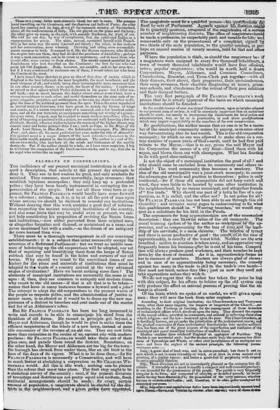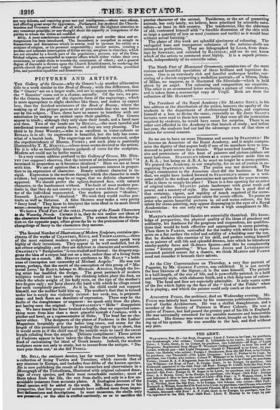PALORAVE ON CORPORATIONS.
THE inefficiency of our present municipal institutions is of so all- surd a description, that nobody at the present day attempts. to .deny it. They are- in fact• useless for good, and only available for mischief. They consume, most unworthily, large revenues ; they establish injurious. monopolies ; they only keep up a pretended police ; they have been basely instrumental in corrupting the re- presentation of the people. Had not all these vices been so ap- parent, Sir FRANCIS PALORAVE would hardly have came forward as a reformer ; neither, as it is, is lie at all the sort of man upon whose notions we should be inclined to remodel our institutions. Without denying that this work contains a good deal of informa- tion respecting the ancient municipal institutions of the. country, and also some hints thatmity be useful ,even at .present, we can- riot help considering his proposition or reviving the Saxon forms and iustitutions,—now either perverted- from their original uses, or altogether forgotten and disused, or maintained as a. riame,and never nientioned but with 4 smile,—as theAream of an antiquary far.more learnedthan wise.
There must be. a thorough-rearmng-ement in all our municipal establishments : it is. a, subjectthatosonst necessarily occupy. the attention-of a ReforniedTarliarnent but we trust no middle, mea- sure of bolStering up the old corporations will beadopted,, nor yet thatof -repairing and beautifying thenilroni the heaps of Saxon rubbish that may be found in the holes• and 'corners of Our old towns. Why should we resort" the uncivilized times of our Instory.for the-plans and materials of institutions that nnist be adapted to tits ,wants of a country arrived at the very, advanced stages of civilization? HaVe we learnt nothing since then ? The elements of municipal institutions are necessarily the, same in all ages : if; then, they are common to antiquity and modern times, why.- resort to old names—if that is all that is to betaken— names thathave: in many instances become abyword and a joke? The attempt to adapt the old-corporations to the present wants of the people as respects: police; and the administration of justice in minor cases, is -as absurd as it would be to dress-up the new ma- gistrates of a district in breeches and coat made out of the scarlet and fur of an Alderman's robes. " - But Sir FRA.Dicis PALGRA.VE has been *long immersed in writs and records to be able to.,enianciPate his mind from: the
thraldom of oldforms.- He cannot in .,principle.get. beyerlua
Mayor and Alderman, though he would be glad to Make them the efficient magistrates-of the whole of a-new town, instead- ef _ mere
idle consumers of the revenge Add one. They are now little
more than curiositiesin the centre„:ani ancient:city-with-modern purlieus : Sir FRANcrs PALGRAVE would take= theme out-of their glass case, and parade them round the' district.. Sometimes, on the other hand, the: Mayor and Aldermen are too big:for the town: the borough has shrunk from under, them, like an old limb in the
hese of the days of its vigour, • What is.to be dime; theti,for Sir
FRANCIS PALGRAVE is necessarily a Conservative, and will have as much horror at abolishinga corporation as Sir et:I-A.)3.1.4s 1V-tr .TRERELL would. All this is idle work : nothing. can-be plainer
thanthe reform that must take place,. The first step oug,htto be a statistical survey of the -country:. next„if the preSeet divisions of- townships and districtsiare not-pretty equal and uniform, fresh
territorial 'arrangethents should,: be made for everx. cert4J-i#
amount of population,. al be:elected the tlis-
RiPts in the deig*olnlitcap and tqco'1110111tPd• The magistrate-men beittnalifincl.! stir:41fia * ned by ApP#0, tsdecisuik. lie to quarterly-sessions, composed; of tlic.inigitto,t4oriLeestain number of neighbouring districts:, Theciffioe:of...- inagittrateshetild be made WprefessiOni:bereSPectablypaid; and tenable forlife.;''and removeable, only on, the-pretentment of 'a • complaint.. signed b two thirds Of the Male population, to the qoarter:SekSionS, or per; haps. an amulet session or county: session„liehlfOr that and etlauT
purposes.: .
Where the population is thick, so should the magistracy be if a magistrate were assigned'. to every .fire' thouSand inhabitants, 4 town of twenty thousand inhabitants would have fpur efficient., active, popular magistrates; _who would be worth. half a dozen Corporations, Mayor, Aldermen, and Common Councilmen Chamberlain, Recorder, and, Town-Clerk . put .together—with all their dinnerS, their ShowS, their pregreSSeg, their, Mansionhouses, their snug "revenues, their charities (beginning. MG 'houle) gram-, mar schools, and alinshouSes.for.the retreat of theig.poor relations and their decayed butlers.
The very first .paragraph of Sir FRANCIS PALQRAYR'S work proves that he is utterly' ignorant: of the basis 94 Which municipal institutions should he. founded—, • In the establishment of new municipal. Corporations, upon Principles.a4pted to our present state of society, it will be extremely. impiartaut that an endeavour should:he snide, not merely. to iticorporate,the inhabitants; for local police and administration, buti. as far as. is practicable., to see..k :those 4u04ifioationit which may impart respectability to; the members of the, new communities.,
. By quad cations, the author Means •that.ue one is to' bea.menle bet of the .municipatcommunity unless-by paying., •or itiseineother way demonstrating that he has wealth. This is. the old:corporation monopoly; by which no one was allowed to Make shoes on acer- tain number of square yards ofGod's•earth, untitibe had first paid tribute to the Mayor,---that is to say, 'given the said Mayor and his • Corporation the means of a city feaatlined,,therri With fat capon, and blown them•out with champagne. What, hat_ feasting to. do With good Shoe-making? . - •
Is not ,the object of a municipal:institution:the good of all ? and why -should some be-excluded from: its community and others in.0 chided? • The- word- community thus becomes a mockery. 'The idea' of the. ekl.' municipality was.a joint-stock monopoly; to secure the advantages of trade and position to' themselves police is only incidental,----for if these old monopoliSts did not keep watch and ward, they Were liable to he harried by some other institution in the neighbourhood, by no means municipal, and altogether friends of "-free trade." Why should one part.Of toWnhefree of a cop, poratibn, as it is called, and the other not? Is not police for all? Sir F.!it.A.Dt.cis:PAI.GRAyR has not been able to see through this old absurdity ; and occupies many pages in end.eavouriag to fix.whal this-qualification should be. " Wearing- breech.es,7 we would sug-
gest as a substitute: for his 25t1I. in the Funds. _ • . : .`z
The arguments-for 'long-apprenticeships are ofi the ithsoundeat description : they are: likewise relies-of the old monopoly.
morattraining spoken oby t en he .author as-dergerie by `the f- e .-ap;
prentice, and as compensating for-the 'ions' of titneAtid the hard- ship'of his servitildeilt ft mere Chlinera:.'- 'The -ielatiOn'of tyrant and's-lave is never productive of good l• the 0s:tilt:Rid the ease ot apprenticeship, is usna,ily.of the worst kind. Neither are-the arts benefited: ave. to exertion is taken,away, and an apprentice very frequently learns-his business after he is out of his.time, Compe4 tion Will always produce-good workinen, and Oeir, number be kept} .down.by the want. of demand. As.it is,. upPrenticeship4brms no bar toinerease of numbers. Masters are always glad of. slaves: and in case of no apprenticeship being •necessary,. the remedy' against too many in the:trade is still in the" trade s- own haridSL-- they need notteach unless they like; Just as now- they need'uot
take apprentices uniesstheY wish it: • . .
We-do nottegret that the author has taken, the pains he he4 with this subject; for his efforts to bolster up the -.old systeta can only producethe effect.on rational, persona of ,proving that :the ate tempt.ia abSurd.
or the hints which we spoke-of- as useful; we will' givaa, specie
men.:- they will- save the book-fromutter neglect te—ft • According to..their original institution;.- theoChurchwarderts: and !Vestrymen were, what their name imports, the keepers or: inspectors-of the Church,—ass Sembliegiin: the Vtstfary, or Sacristy, for the.management of, those • Inanches
of ecclesiastical which devolved.uponthe laity:. :Whey directed therePoim! of the sacred edifice„ provided its ornaments,„and assisted inogollectingAgsp,olreog which religton',--not the law bestowed upon the poor. The:Che.rchwardensos fani knOwn are yet mader,the jurisdiction of the, eeeleslastieat courts; an? the gradual. conversion Of these.Ceplesisstical. firnetionaties th...si has been one of the great sources of the iroperfection, and Confusion-oftlid municipal and gyai municipal institutions of vae&rii. times.. • • ' 'Modern statites have rendered' EiiglaiirP• an -eggrt.:ate- of .Parithes:. • Parish'-is:ont territorial unit;- buitit#'..olicient4ntits Vier&the &tmono-law divi- sions • 'of • Tovnithips: and,Wiads, Or. other eitilltirisille.tions of an •anatogonenaii ture : and from the neglect of thin' ancient principle, the "following. 'new:
veniences arise :— -----
40341.1k$Feat4al: Of 144 aaid; eatrarp.amehiali bat there is ED( an acre which is not, insOrn4 township or' ward, or at:least: In, some :ancient, civil precinct, of a sirail4i,natureli. and hence a great deal Of, perRteotty. with respesc -to extra-paroi;hhil diStricts. '2illy,, These divisionSire not so 'conVentently, planned as the•,,cottnotirlaiv, di: teivniliip or a ward is usually a eon:Meet-Mid weltrroundet1Preeinet: it wasiiitendeirfoi the- goitirmnent dithe people .• 'Thepaiiili is very frequeuill irregidar thitsIdinai••iirt- •eonfpotied outlyaig or detirelied'parcelS;•-its bona dandadatingteentfiReitairlerrby theOsteMionos-bf the early pitrons,, Whether LiYmen er-eedesiastivalibedlie; wick ;therefore, iri,lbiptgi-Squalraultifeions duties have beeniseproniclentI3t asiniiniAleteci 4914;Thiilliglottifetft.aust Yeltaiateb.sfitaRtte.., after:: NOW) setae of Allestalatics
are very delicate, and requiring great tact and intelligence,—others very odious, and affording great scope for oppresaion.,Parlianient. has readered the Church-
Wardens and Overseers of af all work, without the slightest attention to any consistent princisile,'.or any thought about the capacity or competence of the
parties to whom the duties are confided. • 4thly, A most mischievous confusion of religious and secular ideas and ar- rangements has been introduced. The Incumbent is compelled to mingle in transactions and discussions which in nowise tend to increase his utility as a minister of religion, or his personal respectability ; secular notices, creative a profane and indecent interruption of divine service, are given in churches, which are not attended by a fourth part of the population; persons, not of the Esta- blished religion are compelled to execute offices Which either violate their own conscience, or e ffi enable them to trouble the consciences of others; and a general
degree of discredit is thrown upon the Church Establishment, by rendering the parish-church the grand and vulgar theatre. of parochial taxation, parochial Jobs, and parochial squabbles and dissensions.



























 Previous page
Previous page